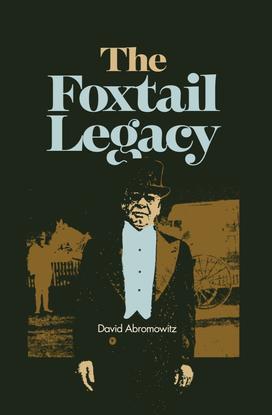David Abromowitz ’78’s Novel Explores the Immigrant Journey
The book: In his debut novel, The Foxtail Legacy (Waterside Productions) author David Abromowitz ’78 tells the story of Jacob Itzkowitz, a teen who embarks on an immigrant journey across three continents. He leaves his village in Czarist Russia to chase the possibility of making a fortune in South Africa during the 1890s gold rush. Through various twists and turns, Jacob and his wife Shira make a new life for themselves in America during the 20th century, but encounter challenges when a secret is revealed. The Foxtail Legacy explores relatable immigrant struggles and the ultimate desire to achieve the American dream.

The author: David Abromowitz ’78 earned his undergraduate degree from Princeton’s School of Public and International Affairs and is a graduate of Harvard Law School. He is the founder of the New Power Project, a national effort to support people who have grown up experiencing poverty in running for local elective office. His writing has appeared in the Boston Globe, Los Angeles Times, and Huffington Post, among other publications. Abromowitz also serves on the boards of the Jewish Community Relations Council of Greater Boston, B’nai B’rith Housing New England, and the Princeton Class of 1978 Foundation.
Excerpt:
Point Pleasant, 1966
On that mid-August Friday afternoon, Point Pleasant was swelling up with wave after wave of “bennies.” For a few more weeks, throngs of weekend partiers and day-tripping families would continue to surge into town like a solar high tide. Beach badge sellers and boardwalk kiddie-ride operators worked long shifts to handle the summer inflow. Only after Labor Day weekend would the flood dwindle to a trickle and allow the town to drift gently back into its usual seaside torpor. Today was still high season. With a forecast in the mid-90s, there was more money waiting to be separated from tourists.
Route 35 was bumper to bumper with tricked-out Chevy Impalas crawling in the wake of wood-paneled station wagons and sporty Mustangs. The occasional Cadillac or Lincoln bobbed in the river of vehicles owing non-stop all the way from Exit 98 to the far end of the Manasquan River bridge. Some cars peeled off at the Broadway exit, heading for the phalanx of clean and tidy motels catering to family groups. Beaters packed with friends from Paterson drove the few blocks further to Arnold Avenue, then fanned out through side streets like mice in a maze, searching for guest houses with vacancies. They parked on the front lawns of stately Victorians converted into summer lodging with names like Kelsey’s Kottage and Bosun’s Quarters, where young workers from Jersey City, away for a drunken weekend, plunked down $7 a head for a spare room and shared bath. More upscale autos drove east nearly to the Atlantic, turning right on Ocean Avenue before depositing well-heeled visitors at the few elegant hotels occupying valuable beachfront turf, like the Oasis-by-the-Sea.
The locals couldn’t agree on why they all called tourists “bennies.” Old timers claimed the beachgoers used to arrive by train waving a ticket stamped from one of five main departure points, Bayonne, Elizabeth, Newark or New York. Others asserted that it mocked Italians proclaiming the Shore’s healing ocean breezes “bene” compared to the miasma up North. Most bet on the money theory: that the townies’ derisive term sprang from show-offs ostentatiously passing $100 bills bearing Benjamin Franklin’s portrait for every little purchase. Whatever the origin, if you lived in Point Pleasant you made your livelihood off bennies all summer, then spent the off-season scorning them.
Especially profitable were impulse travelers who hopped on the last train south. On arrival they’d desperately dash to the ticket counter in the ancient railroad station, imploring the kindly gray-haired cashier to reveal where they could buy a bathing suit. “You have a couple of choices,” she would invariably advise, “but I’d say try Itzkowitz’s first. They have the biggest selection. Just a few blocks west on Arnold.” As grateful tourists hurried away, the cashier would silently thank old man Itzkowitz. Back in the ’40s the savvy merchant had started the tradition of slipping her a generous Christmas gift for having a ready answer to such questions, a tradition his son Lewis still carried on.
In front of the white stuccoed Itzkowitz Department Store that Friday, a dapper looking man in his sixties was hand-cranking down a row of green and white striped awnings. Lewis Itzkowitz had been performing this ritual, protecting the merchandise, every sunny summer afternoon for nearly four decades. Although Lewis was President of Itzkowitz Company, Inc., he personally handled the chore, emerging through the men’s store door just in time to block the intense light from saturating the lower half of the two-story building.
A few blocks away, ten-year-old Jake pedaled frantically, straining to return to the store before his father finished with the awnings. Atop his re engine red Schwinn Stingray with its V-shaped handlebars and banana seat, he imagined himself part of a pack of leather-jacketed bikers, like the riders in the Wild Angels poster outside the Globe Cinema, as he shifted into high gear and sped past kids on clunky one-speeds. He pumped his legs extra-fast, making up for having lost track of time playing outfield at the Little League field. Zooming over the railroad tracks, he spotted his father silhouetted against the descending sun. Jake calculated that he could reach the back entrance of the store and slip in just before five, when Pop had said they’d talk about something important. He didn’t want to be late, especially if it was about the Big Sea Day parade.
Next Saturday was Big Sea Day, the pinnacle of each summer. Jake’s father told him once that the tradition started a century earlier when farmers and townspeople from all over the area would come together for a festival of ocean bathing, fishing and clam digging. Local lore claimed the gathering originated even earlier among the Algonquin and Leni Lenape tribes, who allowed white colonial settlers to join in their August rituals. For Jake, Big Sea Day was the special Saturday in mid-August when tens of thousands lined the streets for the mile-long stream of string bands, drum and bugle corps, politicians in sports cars, beauty queens on oats, and reenactors costumed like 19th century settlers snaking through town. Last year he’d finally achieved his dream of riding in the parade. He felt a knot in his stomach, wondering if Pop would let him do so again.
Reprinted with permission from The Foxtail Legacy by David Abromowitz. All rights reserved.
Reviews:
“It’s an origin story familiar to many American families — a young man, armed with big dreams and few prospects, sets out from the Old World to the New — but in his debut novel, The Foxtail Legacy, David Abromowitz molds it into a richly detailed and deeply moving saga.” — Robert Masello ’74, bestselling author of The Einstein Prophecy
“With clear vision and an eye for story, he re-introduces us to the wonder of a family’s history, showing us where we came from, and why we arrived at “here.” Every family with immigrant ancestors can see itself in the tale he tells.” — Susan Katz Keating, award-winning investigative journalist, editor and publisher, of Soldier of Fortune












No responses yet